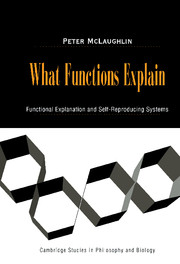8 - Feedback Mechanisms and Their Beneficiaries
Published online by Cambridge University Press: 12 August 2009
Summary
As we saw in Chapter 5, the etiological analysis of biological functions most successful in reconstructing the intuitive notion of function (Ruse's) was able to attribute functions to new traits, but only at the cost of admitting that perhaps teleology could not be expelled from biology. That is, the metaphysical costs of functional explanation might include final or holistic causality, and biologists might either have to swallow this or begin to talk differently. Natural selection might not in fact eliminate teleology from science. If this holds for biology, it can also hold for social science. Ruse avoided the obvious counterexamples involving new traits by appealing to the adaptive character of a function: X has Y as its function only if Y is adaptive – adaptive is not a technical term such as “contributes to inclusive fitness.” It means only that Y is good for the organism in some way, presumably by contributing either to survival or to propagation (or to both). Thus, in order for X to have a function, there must exist some system S (which has a privileged relation to X) that can be said to possess a good.
The difficulty many adherents of the etiological view have seen in the benefit or welfare condition is that, if the benefit is not bound up with natural selection, it might turn out to be entirely accidental with regard to the origin of the beneficial trait.That is, besides natural selection, they see no possible feedback mechanism producing the function bearer that involves benefit.
- Type
- Chapter
- Information
- What Functions ExplainFunctional Explanation and Self-Reproducing Systems, pp. 162 - 190Publisher: Cambridge University PressPrint publication year: 2000



